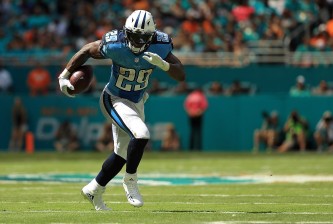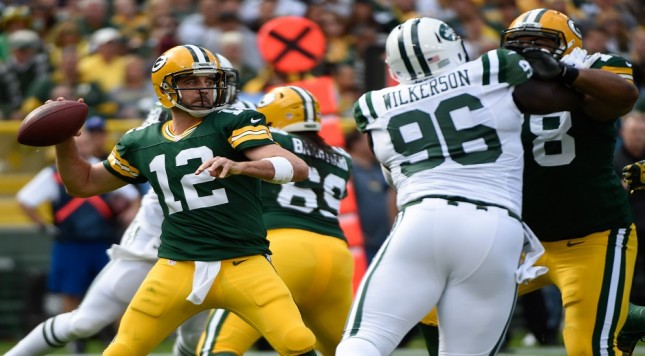Avoiding a 0-2 start was crucial for the Green Bay Packers. Things looked bleak early—Aaron Rodgers turned the ball over to give the New York Jets an early lead and Green Bay trailed 21-3 midway through the second quarter. Rodgers and the Packers responded by outscoring New York 28-3 in the final 36 minutes. Let’s take a look at what we learned from the Packers 31-24 win.
Packers can’t handle the read option
Ever since Colin Kaepernick torched them for 181 rushing yards in the playoffs a few years back, Green Bay has been inept against opponents who use the read option. It happened last week against the Seattle Seahawks and on Sunday versus the Jets.
New York broke out to an early 21-3 in part because of using the read option. Geno Smith pitched the ball to Jeremy Kerley for a 37-yard run, which help set up a 14-0 lead. Smith used his athleticism often in the first half and Green Bay didn’t have the discipline or awareness to stop it. Once New York curiously went away from it, they were held to three points.
This will remain an issue all season—Green Bay has shown zero reason to believe they will improve. All you can hope for is that they find a way to contain the ground game early, allowing Rodgers to take the lead and make the opponent play catch up.
Davante Adams should replace Jarrett Boykin
Mike McCarthy is a veterans’ coach8—he will not just give a promising rookie a starting job just because they were a high draft pick. He has made Ha’Sean Clinton-Dix earn every snap on defense and now Davante Adams has earned that time as well.
Jarrett Boykin was the sacrificial lamb last week matched up against Richard Sherman—he might have lost his starting job this week. He was targeted just three times on the day, dropping a perfect ball in the red zone and catching one pass for three yards. After the drop in the second quarter, Adams replaced him.
Cobb with the TD, but Davante Adams with one of the big plays on that drive. Guessing he’s the No. 3 WR the rest of this game, and beyond.
— Rob Demovsky (@RobDemovsky) September 14, 2014
The rookie shined. He finished the game with five receptions for 50 yards, including a big catch inside the red zone. Adams also came inches away from his first career touchdown. The second-round pick is more talented than Boykin, and now he has earned the right to start over him.
Play calling needs to improve
Last week I wrote about McCarthy’s decision to avoid Sherman the entire game and being forced to work with just 2/3 of the field. While Green Bay used the whole field this week, there were still problems with McCarthy’s play calling.
Green Bay preached about balance on offense coming into the season, with a plan to have Eddie Lacy rack up chunks of yards and Rodgers to carve up secondaries with short, quick passes. In the first half, Lacy carried the ball just twice and Rodgers kept trying to go deep with little time to throw. Once McCarthy switched back to the fast-paced attack with quick passes and runs, Green Bay was successful.
Two big divisional road games against the Detroit Lions and Chicago Bears await. So McCarthy and Rodgers have to be smarter with the game plan and execution. Green Bay must stick with the running game and let Lacy get rolling, while Rodgers attacks short to set up the deep pass later in the game.
Inconsistency on the offensive line
Credit is due to the Jets, they have an outstanding defensive front that can generate pressure with the best of them. But the Packers offensive line was increasingly inconsistent this week, especially at right tackle.
One more and he’ll lead the league in sacks allowed. Hasn’t played one full game yet. RT @Paulimig Derek Sherrod allows a sack … #Packers — Justis Mosqueda (@JuMosq) September 14, 2014
Derek Sherrod was pushed aside like a rag doll early in the first half. Quinton Coples and Muhammad Wilkerson slipped past him on multiple occasions. He also struggled to block for Lacy. Guard T.J. Lang gave some help, but this resulted in miscommunications and a sack given up on a stunt.
There was improvement in the second half. Rodgers had more time to throw and he took advantage of it. While the protection got better and became “adequate” as the game went on, the Packers really have to hope Bryan Bulaga can return soon.
Self-inflicted wounds are the team’s biggest roadblock
Green Bay showed two things on Sunday—they are a resilient team and love to find new ways to hurt themselves. It started on the first play when Rodgers muffed the snap at the 16-yad line and the Jets recovered. Green Bay also allowed New York to convert on two of three fourth-down attempts.
These are the type of mistakes that can kill a team, especially in close games. Giving up plays on fourth down takes away extra possessions for Rodgers and it keeps a tired defense on the field. This just leads to more points for the opposing team and the problem only grows as the game rolls along.
Once the Packers fought through their own problems, they had no problem beating the Jets. This team got a reality check at home trailing 21-3 and responded with a 31-24 victory. If they can eliminate the self-inflicted wounds, there is no doubt they can win the NFC North.























